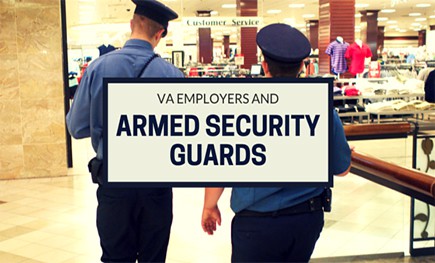Violence in the workplace has become a growing concern for businesses and business owners across the country. In Virginia, employers of all sizes are actively considering, many for the first time, whether it would be prudent to have extra security personnel on hand and wondering whether they can be held liable for actions taken by security guards on their premises. The good news for employers in the Commonwealth is that such liability can be mitigated with the right policies in place.
No Employer Liability for the Actions of Independent, Third-Party Security Personnel
Generally, an employer is not liable for physical harm or workplace injuries caused to another by an act or omission of an independent contractor or its servants. While there are a few narrow exceptions to the general rule — for work that is unlawful, a nuisance, or is inherently dangerous unless special precautions are taken — it is well-settled law in Virginia that an employer is not liable for actions taken by an armed security guard that is an independent contractor of the employer.
The Supreme Court of Virginia concluded in Broaddus v. Standard Drug Co., Inc. that a drug store could not be held liable to the plaintiff, a drug store patron, who was shot by a hired independent security guard as the patron was fleeing the scene, after an altercation with an off-duty police officer.
The Court reasoned that the security guard was: 1) an independent contractor of the drug store, not an employee; and 2) the security guard’s work was not the type that would typically produce injury absent special precautions.
Similarly, in Cherry v. Palace on Plume St., a business contracted with a security consulting firm to provide security guard services on the business’s premises. Plaintiff sought damages from the business for an assault and battery by one of the third-party security guards that occurred on business property.
The Court, relying on Broaddus, concluded that the business was blameless, finding that: 1) the business had a legitimate independent contractor relationship with the security consulting firm; and 2) that security guard work was not unlawful or a nuisance, and would not result in injurious consequences unless precautionary measures were adopted. The business could not have reasonably anticipated that one of the security guards would commit an assault, according to the Court.
Therefore, employers should not be liable for the actions taken by third-party security guards, as long as they clearly establish and maintain an independent contractor relationship by:
- Contracting with an appropriately qualified third party for the security guard services;
- Being certain that the security guards are employed, discharged, paid, and controlled by the third party;
- Taking no active part in the selection or choice of guards to be used on any given day;
- Reporting unsatisfactory work to the third party contractor, not the security guard; and
- Maintaining very little direct contact with the security guards.
Employer Liability to Employees for Workplace Violence
Virginia employers are insulated from personal injury claims by their employees when the injury arises out of and in the course of the employee’s employment. The Virginia Workers’ Compensation Act (VWCA) is the employee’s sole and exclusive remedy against the employer.
Notwithstanding the VWCA’s blanket coverage, an employer still has a duty to protect or warn an employee against criminal conduct of a third party, but only in a few very narrowly defined situations. In Virginia, whether an employer has satisfied the duty to protect or warn depends on whether the risk of employee injury was actually known to the employer or was somehow reasonably foreseeable.
Acts of criminal behavior by third persons have not been found to be reasonably foreseeable by Virginia courts. Nor has Virginia enacted a law to shield employees from workplace violence or to require employers to implement workplace violence prevention programs. Thus employers should not be liable to an employee injured by workplace violence, unless the situation was one where the specter of violence was obvious beforehand – e.g., an ongoing domestic dispute, coupled with a history of domestic violence and a current threat of violence against an employee.
Nevertheless, it may be prudent for Virginia employers to consider implementing enhanced workplace security policies and practices.
Policies to consider
- Implement a written violence-prevention program;
- Establish a zero-tolerance policy towards violent words and acts in the workplace;
- Develop and maintain a workplace violence incident report system;
- Provide each employee with information on risks of workplace violence, specific to their workplace, at both the time of hire and periodically thereafter;
- Provide safety education for employees;
- Increase appropriate staffing during high-risk periods; and
- Notify local law enforcement immediately if customers or visitors engage in violent or potentially violent behavior.
Additional Security Measures for a Publicly Accessible Building
There are some further security measures to consider, if the building in which your business is located is accessible to the general public. Many commercial buildings or offices have a lobby in which the receptionist can be accessed by anyone walking in, which allows for the possibility of a disgruntled customer or client to commit a violent act. The following measures may decrease the chance of this happening:
- Secure the workplace:
- Control access to the office;
- Install a protective glass/barrier between the area for the public and employees;
- Install a silent alarm.
- Provide drop safes to limit amounts of money in the office.
Workplace violence has unfortunately become increasingly common. However, with a few straightforward security measures, employers can decrease the chance that violence will occur at their place of business, and thereby limit liability in the case of an incident.

